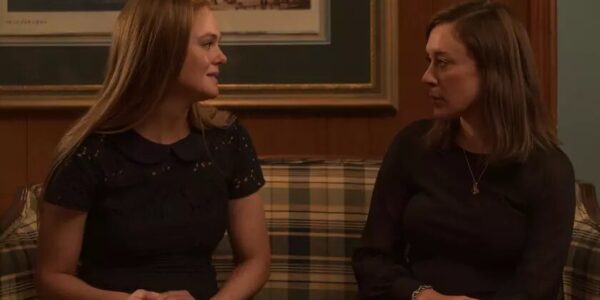‘The Girl From Plainville’ reimagines the proper crime it depicts. Mostly, it really works

In “The Girl From Plainville,” premiering Tuesday on Hulu, Elle Fanning performs as Michelle Carter, who became infamous in 2015 when she became indicted on a fee of involuntary manslaughter for encouraging her boyfriend, Conrad Roy III (Colton Ryan), to kill himself. The resulting trial (ancient reality spoiler alert), which observed Carter convicted, changed into countrywide news, protected in properly-researched magazine portions and slightly knowledgeable social media posts. It’s additionally the problem of the 2019 two-component HBO documentary “I Love You, Now Die: The Commonwealth vs. Michelle Carter” and the 2018 Lifetime movie “Conrad & Michelle: If Words Could Kill.” She regarded easy to hate, on the time, at a look.
Michelle and Conrad, called Coco by means of his family, met in real existence on holiday in Florida; they lived not extraordinarily far from each different in Massachusetts but performed their subsequent relationship remotely, especially through texts, a flurry of phrases out of which they built a disastrous bubble. It turned into those texts, which proven Conrad’s dedication to killing himself and Michelle’s to help or make — this is the question — he does it, that constituted the majority of the case. And it became a textual content from Michelle to a pal confessing (or claiming) that it becomes her fault that Conrad died that caused her conviction: In the midst of gassing himself in a truck in a Kmart car parking zone, he was given scared and got out, Michelle wrote, and she or he instructed him to get lower back in.
Created via Liz Hannah (“The Post”) and Patrick Macmanus (“Dr. Death”), with Lisa Cholodenko (“Unbelievable”) directing the first two episodes, the new miniseries is considerate and intelligent. Like maximum such collection in the Hook ‘Em and Hold ‘Em streaming era, it’s miles, at eight episodes, longer than it desires to be, but individual scenes are well written and properly performed, with no less than filler. The tone is neither sensationalistic nor judgmental. It appears properly. It touches the principle actual bases, with customary adjustments for narrative convenience. (For a few motives, Michelle is represented as 18 on the time of Conrad’s death, when she was 12 months younger.) If some of its dramatic contrivances enhance questions or experience a touch ridiculous, it’s no longer hard to apprehend the thinking at the back of them.
Notably, text exchanges between Conrad and Michelle are enacted through the characters head to head — in each other’s bedrooms, on a country road at night time towards a chorus of crickets, on a pier, and so forth. (We soon glean from context clues that they’re no longer truly collectively.) It’s a realistic opportunity to drive the viewer to read the texts or have them study in voice-over, and it lets the actors to bring emotional context and dramatic shape to exchanges; it we could “The Girl From Plainville” be a love tale as opposed to against the law tale. It makes a case exclusive from what one might have studied within the information.
Artistically, there’s nothing wrong with this — it accommodates a form of epistolary play, like “Love Letters,” inside the play. And interpretation is part of the manner. There are many methods to play Romeo and Juliet; anything instructions Shakespeare left to posterity should be gleaned from the text itself. As records, but, “Plainville” is inescapably a Hollywood miniseries, refracted thru the writers, the administrators, the actors, and all down the creative line. It isn’t any better than partly authentic, as lots because it is probably basically real.
The collection, which encompasses the police research, trial preparation and court scenes, moves ahead on dual tracks: one beginning with Conrad and Michelle’s meeting, the opposite progressing from the discovery of his frame. They be a part of up in the long run in an episode that doesn’t stint on the poetic license, or some fashionable thrives to signify Conrad’s country of mind on his very last day: sluggish movement, shallow recognition, sunlight, scenes of nature.
Given that the give-up is mounted inside the beginning, there is an experience that we’re ready, the long term, for matters to return to ahead. To the volume we make investments within the characters, we are less interested in the results than in blame — not the tale, however, the story at the back of the tale, which we can’t actually realize but must determine for ourselves. Conrad and Michelle have been, after all, in important respects, mysteries to their personal families, or even if we’ve got now not necessarily been diagnosed with despair and social anxiety ourselves, or contemplated suicide, we’ve got all been teenagers, and a lot of us lonely young adults, for a spell, who would possibly have had problem envisioning a less painful the following day. Adults may have some mind approximately youngsters nowadays with their phones and their earbuds, and “The Girl From Plainville” is glad in order to have them.
The show belongs to Fanning, to Chloë Sevigny as Conrad’s mom, Lynn, and, to a lesser extent, Ryan, although Conrad’s character is extremely constant, inward, and opaque; his rarely wavering suicidal rationale makes him an awful lot a catalyst as a sufferer. Sevigny is exceptional, worn in one-of-a-kind methods before and after her son’s demise, handling him with care but now not child gloves in lifestyles, greater sorrowful than vengeful in a while. She never does an excessive amount. There are masses of other characters, consisting of Norbert Leo Butz as Conrad’s father and Lynn’s ex-husband (loving, obtuse); Kelly AuCoin as a detective pressing the case; Aya Cash as the prosecuting lawyer (ambitious) and Michael Mosley as the protection (hopeful); and diverse buddies and so-referred to as friends and family individuals. They have their moments, but they’re outdoor the primary emotional thrust of the collection.
In a nuanced overall performance, in which nuance might effortlessly deliver a way to histrionics, Fanning reveals an unexpected range in Michelle without making her appear too self-contradictory; certainly, the series is ordered in a way to make us regard her first of all with skepticism and later with a degree of compassion — before everything, a manipulative liar, organizing events to her very own emotional gain, after which someone whose courting with the truth is complex beyond her ability to understand it, a female no longer in control. (She had intellectual fitness troubles of her very own; she had a record of bulimia and reducing herself.) That her cause for encouraging Conrad to stop his existence became to experience effective or to make herself a sympathetic parent and so benefit friends, is a simplification “Plainville” manages to avoid. Only inside the court scenes, wherein Michelle stays silent, does Fanning — an amazing bodily healthy for the lady she’s gambling — seem to be running on the floor, aping the video record, imitating as opposed to embodying.
It is not, as it might be on “Law & Order” or some such, a glance-alike tale, without a doubt unfastened to embroider, however, one which uses the actual names of its major players and their actual words, courtroom transcripts, and different on-the-document statements; vlog-ish films the real Conrad Roy made are re-created right down to the facial expressions. At the equal time, its miles held together by — became television by means of — invented scenes and conversations or even delusion sequences, which include more than one musical number. (Michelle Carter became much suffering from the series “Glee.”) TV and the movies play on this sandbox all of the time — biopics and docudramas are catnip to manufacturers and actors; they get press, they win awards — however, whether or not they get you closer to or farther from the fact of the problem is essentially impossible to mention. They are hypothetical at high-quality, opportunistic at worst.
That doesn’t suggest that such speculative drama is vain. It may additionally spark questions to feed the talk you’re sure to have with this sort of collection — Is this component actual? Is that element made up? — which may end up a dialogue with yourself. “Plainville” may additionally get you thinking extra typically about duty, of media that sells children death-wrapped photographs of affection, of how prepared we’re to agree with we recognize what we only think we recognize. It may additionally at the least remind you that, in an age fueled by means of reductive statements approximately the whole thing underneath the sun, nothing human is as easy as it appears.









 For all latest news, follow The Velkinews Google News channel.
For all latest news, follow The Velkinews Google News channel.